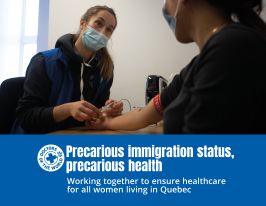Precarious immigration status, precarious health: Working together to ensure healthcare for all women living in Quebec
Cette ressource est également disponible en français.
“Not having access to RAMQ [Régie de l’assurance maladie du Québec] insurance coverage because of one’s precarious immigration status: it is a public health and gender equality issue with serious, frequent, and preventable societal consequences” (p. 27).
An estimated 50,000 people living in Quebec do not have public health insurance coverage (RAMQ) due to their precarious immigration status.
This report from Doctors of the World summarizes how this lack of health coverage negatively impacts women’s access to sexual and reproductive health services. Lack of coverage can delay or prevent a woman’s access to important primary health care and health promotion and prevention services such as:
- contraception and abortion;
- prevention, screening and treatment of sexually transmitted and blood-borne infections; and
- perinatal care.
Doctors of the World recommend that all women living in Quebec be guaranteed access to RAMQ insurance, regardless of immigration status, to ensure access to essential health services. This could prevent many serious and avoidable health problems, reduce vulnerability and stigma related to immigration status, and help address social and gender inequalities.
The report includes actions that individual public health staff, health care providers, academics researchers, and others can take to support women without immigration status (p. 36–37). For example, public health staff working in a regional public health directorate are encouraged to analyze the situation in their area and “highlight the situation of women without RAMQ insurance coverage as a public health issue to provincial consultation bodies and health decision-makers” (p. 37).
Related: From 2016 to 2021, Doctors of the World and partners successfully mobilized to expand health coverage for children living in Quebec whose parents have precarious immigration status.
Use this resource to:
- understand the barriers to and consequences of access to health services — an important social determinant of health and human right — experienced by women with precarious immigration status,
- analyze the needs of women with precarious immigration status in your area to inform policy-makers and to modify public health services to address unmet needs, and
- develop long-term strategies and partnerships with migrant-led organizations and health care partners to improve access to health care and permanent resident status for precarious migrants.
Alignment with NCCDH work:
Immigration status is a foundational determinant of health. The NCCDH is building a repertoire of resources focusing on this determinant and guiding public health to take action on health inequities experienced by the migrant populations in Canada.
Related Resources:
Disrupting migrant work (Mind the Disruption, Season 1, Episode 4)
Related organization: Migrant Rights Network
See other resources on immigration and health equity.
Reference
Doctors of the World. (2023). Precarious immigration status, precarious health: Working together to ensure healthcare for all women living in Quebec. https://doctorsoftheworld.ca/uploads/Rapport_2023_anglais_FINAL_HR.pdf
Tags: Immigration, Community Organization, Document, Report / Document
